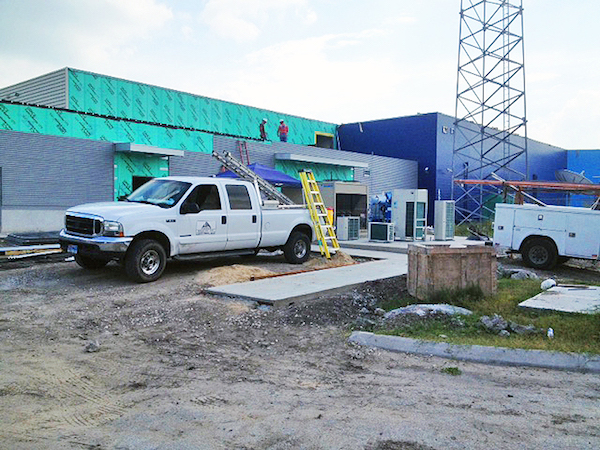Public television has always shared a special relationship with academia. In November, Coastal Bend PBS affiliate KEDT will relocate to a facility shared with Del Mar College, giving the station space to grow — and Del Mar students invaluable real-world experience with the latest digital broadcasting equipment.
“We’ve worked with Del Mar for many years,” said Don Dunlap, a Del Mar graduate who helped launch KEDT in the early 1970s and rose through the ranks to become general manager. “We’ve used a lot of their interns. Many of our current employees are Del Mar graduates. This is just a more formal arrangement.”
At 16,000 square feet, the new KEDT facilities dwarf the station’s previous space at Commerce Park II. That space was always intended to be temporary, Dunlap said — a stopgap that lasted about 42 years.
“We looked at building something freestanding, and it really didn't make financial sense,” Dunlap said. “By that time, Del Mar looked at their future needs and decided that joining us in a shared-use facility made sense.”
Instead of investing $2 million to update from analog equipment, the college can share space with KEDT. While students work during the day, KEDT mostly operates during night hours.
“Our schedules make it so easy to share a facility,” Dunlap said. “And the equipment sitting there costs just as much whether you're using it or not.”
Many public television stations are affiliated with universities, a tradition started when the first public broadcasting station was established at the University of Houston in the 1960s. However, very few community colleges have full-fledged radio and television stations. Dunlap said the unique arrangement will enhance the desirability of Del Mar’s communication programs.
“All of our radio and TV editing rooms and control rooms will be set up under glass with space for observers,” Dunlap said. “What they learn in labs in school is fine, but sometimes it doesn’t show the real-world pressures of time and quality that a workplace does.”
Under the arrangement, Del Mar will provide leased land to KEDT. In turn, KEDT will assume operations management for Del Mar’s cable TV channel, freeing faculty and students to develop content instead of manage the station’s back end.
An outdoor stage will host community concerts, giving a platform to the diverse music styles of South Texas. A dedicated indoor performance area fuels Dunlap’s vision of a TV series highlighting local acts. Dunlap hopes to see Del Mar’s music students filling public radio airwaves with their renditions of classical music — and filling their résumès with real-world experience.
“We hope to work together on community issues and develop public forums,” Dunlap said. “Every year, there's a community issue that develops. Colleges generally host these, but, typically, it’s 100 people sitting in a room. To be able to broadcast it so it's accessible to half a million people will add value to that. They’re already doing them anyway. We’re just broadcasting it.”
KEDT held back on expanding into streaming media for nearly five years, anticipating the opportunity to upgrade facilities all at once. Radio and TV broadcasts now will be available to a much wider audience. A resource called PBS Learning Media will be accessible to area educators, giving teachers access to about 100,000 educational video clips that can enrich classrooms at no cost to schools.
KEDT, the smallest community-owned radio and television station in the country, survives in a vacuum of state funding. Texas is one of only five states nationwide that does not fund public broadcasting. Instead, more than 5,000 families, a number of foundations and businesses come together to support the $2.2 million operation annually. In that sense, KEDT feels especially connected to the community.
“We're going to have a series of mini-concerts on the performance plaza from April 2-9,” Dunlap said. “A family community day on April 9 will bring speakers, gardening demonstrations, PBS Kids characters, and lots of activities for kids inside and out. We want to welcome the people in the neighborhood to meet the new neighbors.”
KEDT goes to school

Constructions crews are still busy at the new site for KEDT, the public broadcasting radio and TV station in Corpus Christi. The station will be moving to the Del Mar College campus sometime in November. Courtesy photo